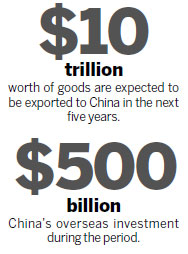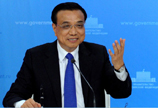
Linking with Central and Eastern Europe
Comments Print Mail Large Medium SmallCentral and Eastern European countries are well placed to achieve mutual benefits with China from cooperation in trade, investment and infrastructure building, said Chinese Vice-Premier Zhang Gaoli.
Meanwhile development of the Silk Road Economic Belt and the 21st Century Maritime Silk Road initiatives will offer huge opportunities.
He made the remark in Prague on Aug 28, when he attended the fifth China Investment Forum and the second China-Central and Eastern Europe leaders' meeting. Zhang was with a delegation of about 700 Chinese government representatives and entrepreneurs to attend the two forums.
The forums were organized by the Czech China Chamber of Collaboration and were attended by more than 1,000 professionals and business executives from China and Europe.
"Like China, the CEE countries have achieved remarkable results in infrastructure developments and are becoming one of the most dynamic and promising regions in Europe. In recent years, we have repeatedly raised the economic focus for the Czech Republic, Hungary and some other CEE countries," Zhang said.
Both the Silk Road Economic Belt and the 21st Century Maritime Silk Road were proposed by Chinese leaders earlier this year as strategies to create China-Europe cooperation.
The proposed land-based Silk Road Economic Belt begins in Xi'an, runs through Central Asia to Eastern Europe, and later reaches Western Europe. While the sea-based Maritime Silk Road begins in Quanzhou, heads south to the Malacca Strait, across Africa and then connects to Europe.
Zhang said China's large consumption demand could create a big market for CEE countries' exports. China's economic growth so far was on target for the year and the government was committed to the country's reform and further opening-up to create an equal playing field for foreign companies.
In the next five years, China is expected to import more than $10 trillion worth of goods, and make $500 billion from overseas investment. More than 500 million Chinese tourists are expected to make overseas visits, all of which will create opportunities for CEE businesses, Zhang said.
Analysts said that the Silk Road programs are likely to facilitate foreign trade, investment initiatives and tourism in the covered areas.
A key milestone for China-CEE cooperation was in April 2012, when China's then-premier Wen Jiabao visited Poland to attend a meeting with prime ministers from 16 CEE countries.
The meeting became the springboard for "16+1", an initiative Wen proposed for China and CEE cooperation. It set out a wide range of ways for China and CEE countries to cooperate, including a Chinese credit line of $10 billion to CEE countries for infrastructure projects.
The credit line is available for financing over a 15 to 20 year period, and is available to the 16 countries of CEE to finance projects in the areas of high-tech, renewable energy, production, raw material exploitation, road, railway, airport construction and public utilities and power plants.
Last November Chinese Premier Li Keqiang, attended a China-CEE leader's meeting in Romania's Bucharest. During the meeting he announced 12 proposals to push forward cooperation between China and CEE countries. Key areas of cooperation included projects in economy, culture and education.
Zhang said infrastructure building in CEE countries was a promising area for cooperation, especially railways, highways, ports and energy sectors.
"The 16 CEE countries are committed to economic restructuring. They have great demand for investment in infrastructure building, and they have high hopes for more exports and more foreign investment. China on its part, has huge potential in its domestic market, and has seen fast increases in its overseas investment," Zhang said.
CEE countries are also attractive destinations for individual Chinese companies to invest because of their favorable investment environments.
For example the Czech Republic's long-standing industrial strength has already attracted a number of Chinese companies to build factories there.
These include white goods manufacturer Sichuan Changhong Electric Co Ltd, canned food producer Shanghai Maling Aquarius Co Ltd and Yuncheng Plate-making Co Ltd.
In Bulgaria, China's Great Wall Motors established a factory to manufacture cars for the European market in partnership with local company Litex Motors.
Zhang said China welcomed investment from CEE companies, and in the process it would bring them advanced technologies and expertise that would aid their development.
cecilyliu@chinadaily.com.cn

Background




